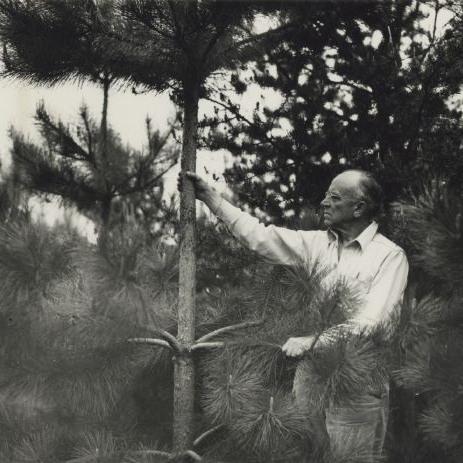By Coggin Heeringa, Interpretive Naturalist, Crossroads at Big Creek, Inc.
In 2004, Gov. Jim Doyle signed legislation designating the first Saturday in March as Aldo Leopold Day in Wisconsin. At Crossroads at Big Creek, our first event was in 2007. This year, we will continue the tradition of celebrating the life and legacy of Wisconsin’s most influential ecologist/philosopher, Aldo Leopold, and to use the day for re-dedication to Leopold’s concept of a “land ethic.”
Nancy Rafal (who at that time served as Door County Poet Laureate) suggested that Crossroads host our first Door County Aldo Leopold Day. Because so many environmentalists have been inspired by the works of this Wisconsin writer, and because countless people read and re-read his essays to renew their commitment to the land, the idea of inviting professional actors and other volunteers to read the book aloud and to invite the community to stop by for a few minutes … for an hour….perhaps for the whole day …seemed the perfect way to share Leopold’s legacy.
Since then, we have held Leopold Breakfasts. We’ve participated with our partners in conservation, The Land Trust, The Ridges Sancturys, The Clearing and Write-On Door County in hosting stwo-day progressive Marathon Reads throughout the county. We’ve celebrated Leopold’s graduate student Fran Hamerstrom. And Emma Toft. We’ve masked up to offer social-distanced outdoor readings. And in 2011, we hosted the Wisconsin premiere of the documentary “Green Fire: Aldo Leopold and a Land Ethic for Our Time”
The screening was a memorable event. The lecture hall was filled to overflowing learners of all ages and was a “whose who” of Door County environmental advocates and leaders. I turned to the late educator/environmentalist Carl Scholtz and commented, “It looks like we are preaching to the choir.”
“Good,” he said. “The choir needs to get together and practice from time to time.”
And that is why we re-read and reflect on “A Sand County Almanac” each March. Sometimes we in environmental field get so overwhelmed with paperwork…… grant reports, budgets, management plans…we need to pause and ponder Leopold’s words and to take a bit of time to observe the beauty and complexity of nature. This time of year, everybody needs a little inspiration.
So we invite the community—whether or not folks have read this short literary classic—to join us on Saturday, March 3 for a afternoon of reflection, nature observations, and a showing of the Green Fire documentary
From 1:00-4:00 Self-guided nature journaling hikes will be offered. Also starting at 1:00, selected reading from a Sand County Almanac will focus on anecdotes of Leopold’s nature observations.
At 2:00 the documentary will be screened at 2:00, and although it is free and open to the public, we expect a good turnout so are requesting reservations. And because the group size is limited, reservations will also be required for the 3:00 Guided Nature Journaling Hike. Visit www.crossroadsatbigcreek.og to RSVP.
Some members of the community will want to prepare, so for the February meeting of the Crossroads Book Club, we selected “A Sand County Almanac.” The group will gather around the fireplace and discuss the concept of a “land ethic” and how it influences current land management practices.
One of the many insightful quotes from this book guides our Board of Directors in its decision making: “Examine each question in terms of what is ethically and aesthetically right, as well as what is economically expedient. A thing is right when it tends to preserve the integrity, stability, and beauty of the biotic community. It is wrong when it tends otherwise.”
And a second quote will sound remarkably familiar to the pre-school-aged children and their caretakers who will participate in our spring session of Junior Nature Club [we still have a few openings], which will start in March. At the beginning of each class the youngsters will repeat a pledge promising “to be a friend of of Nature — the soils and the water, the plants and the animals.” Our little pledge was inspired by Leopold’s Land Ethic.
“The land ethic simply enlarges the boundaries of the community to include soils, waters, plants, and animals, or collectively: the land.”
Visit www.crossroadsatbigcreek to save a seat and for more information.



 ALL CONTENT © 2024 BY DOOR GUIDE PUBLISHING
ALL CONTENT © 2024 BY DOOR GUIDE PUBLISHING




